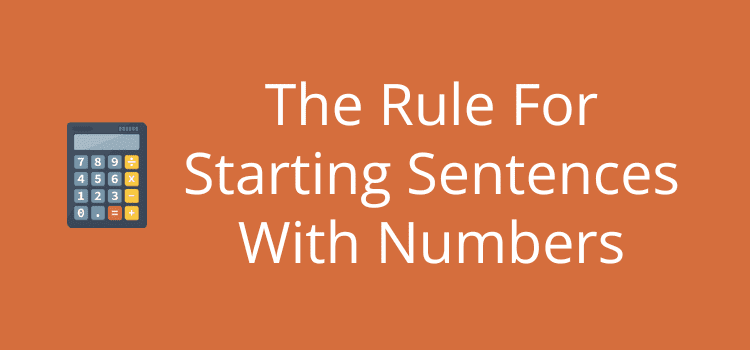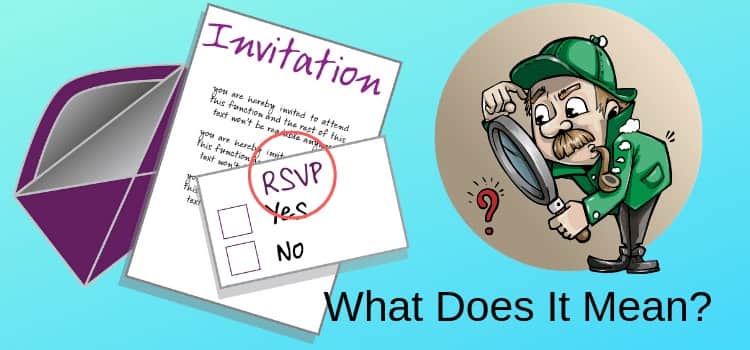
The first rule of starting sentences with numbers is an easy one to remember. Don’t do it.
But a number beginning a sentence is usually grammatically correct, either as a word or a numeral. So why do most style guides like MLA Style and The AP Stylebook say it’s wrong?
The most common reasons are clarity, formality, and style. In other words, they mean it’s always a good idea to avoid it if you can.
But if you have no choice, it’s best to spell out a number if it starts a sentence.
Why you shouldn’t start sentences with numbers
Whenever possible, it’s usually a good idea to avoid starting sentences with numbers.
A number at the beginning of a sentence can cause readers to pause to figure out what it refers to.
It can often break up the flow of the sentence and make it more difficult to read and understand.
Another problem is that it can be unclear what the number means.
For example:
Ten applicants were approved for an interview.
Does it mean all applicants were approved, or only a small percentage?
To add more clarity, it’s often better to move the number to later in the sentence and qualify its meaning.
From a long list of applications, ten applicants were approved for an interview.
Now, there is no confusion about the number and what it represents.
How to avoid starting sentences with numbers
The rules for using numbers in writing are many.
But at the top of the list is when the first word of a sentence is a number; it should be in words and not numerals.
However, in most styles of writing, apart from very casual forms, it’s generally better to move it to later in a sentence.
In most instances, it’s quite easy to do. But like most writers, I sometimes forget, which is simply laziness.
But when I remember, it doesn’t take much effort and always improves the meaning and clarity.
The main reason is that the number is not the primary subject or topic. Here’s an example.
35% of all book sales on Amazon are ebooks.
The real subject of the sentence could be ebooks or book sales. But the percentage simply qualifies the subject.
You can also see that with the percentage starting the sentence, it’s not until the end that we know it is quantifying ebooks.
So, all I need to do is move either subject and also use words instead of numerals.
Ebooks represent thirty-five percent of all book sales on Amazon.
Of all book sales on Amazon, thirty-five percent are ebooks.
Both sentences are clearer and more precise because the number is closer to what it is counting.
Once it becomes a habit to notice, it’s normally a quick and easy fix.
Exceptions to the rule
Can you start a sentence with a number? Yes, there are some instances when it is possible.
Article titles and newspaper headlines sometimes use numbers to attract attention.
In many cases, the title starts with a number for more effect.
7 Proven Ways To Write Faster
10 Effective Proofreading Techniques
Bullet points or lists are also common exceptions.
With them, you are offering information, statistics, or data in a quick, bite-sized manner.
Sometimes, they are sentence fragments or incomplete sentences.
10% failed
50% A passed
30% B passed
10% C passed
Years are also an exception because they are always written in numerals.
But if possible, it is still better to avoid starting sentences with them.
1969 was the most tumultuous year in pop culture. (Okay)
The most tumultuous year in pop culture was 1969. (Better)
You should also take care with dates.
Generally, the date is in numerals, and the month is in words. But it looks really odd if you spell out the date.
Our wedding anniversary is June sixth.
Our wedding anniversary is June 6th. (Better)
With fractions such as 1/4 or 1/5, it can read better if you use a percentage like twenty-five percent or twenty percent instead.
But in technical writing, sometimes it’s necessary to use a numeral fraction or decimal when referring to scientific or academic data.
Expressing approximations
Using number approximations in writing is common, and they often begin a sentence.
Millions of people believe in UFOs.
A significant percentage of people are out of work.
Thousands arrived for the desert music festival.
Sentences like these are usually difficult to rephrase because it can make them wordy or awkward to read.
People who believe in UFOs are in their millions.
People who are out of work are a significant percentage.
The desert music festival saw thousands of people arrive.
It is one form where the rule about starting a sentence with a number is difficult to apply.
When all else fails, spell it out – if you can
If you decide to or have to start a sentence with a number, try to use words and not numerals.
This is easy for numbers up to ten and round numbers up to one hundred or one thousand.
But for complex numbers, it can get tricky because writing them in words is not always practical or easy to read.
If you want to say that 25.69 million people live in Australia, how can you write a clear sentence without numerals at the beginning of the sentence?
Twenty-five point six nine million is too wordy and difficult to read.
The best solution is to move the numeral away from the start of the sentence.
The population of Australia is 25.69 million.
Australia’s population is now 25.69 million.
At least in this way, it follows the rule.
Summary
Yes, not starting sentences with numbers is the general rule. But better to avoid it would be a more logical one.
In most instances, you can rephrase to move a number to later in a sentence. That’s good practice and helps add more clarity to your writing.
But you don’t always need to obey the rules.
Sometimes, moving the number doesn’t make sense, so don’t panic.
The main point of this article is to raise your awareness of this writing point.
Hopefully, the next time you use a number, decimal, fraction, or percentage in your writing, you might pause to consider how you use it.
If so, it might help you make a simple and easy improvement to your writing.
Related Reading: How To Write A First Sentence To Hook A Reader’s Attention



